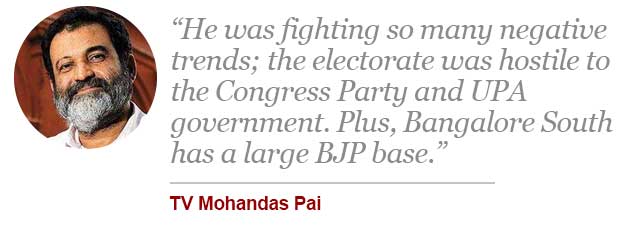It has been 19 months since Nandan Nilekani was soundly defeated in his unexpected decision to run as a Congress candidate for parliament from Bangalore.
These days, he has finally come to terms with what he still recalls was an “intense experience.â€
“Good thing I lost,†he says, chuckling. Had he won, “obviously, I would have had to deliver.â€
The introspection hasn’t been easy for someone with vivid childhood memory of his dad driving him to a rally where India’s first prime minister and Congress leader Jawaharlal Nehru was speaking.
For a man coming off shepherding Aadhaar, one of India’s most successful social transformation projects, jumping into politics had felt natural, almost pre-ordained back then.
“I think politics is the biggest lever of change in India,†Nilekani had said about his decision. And “Congress is my ideological home, I come from a Nehruvian family.â€
Nilekani went into elections with a lot of seeming momentum and some amount of hubris, as he took on a powerful incumbent in the Bangalore South constituency, the BJP’s Anant Kumar.
At the unique identity project, Aadhaar, a giant government effort to issue biometric identity cards to hundreds of millions of Indians, he had just built and scaled a world-class enterprise.
“I was (there) until March 15 (of 2014) or something,†Nilekani recalled. “I had set a goal which I had promised to the prime minister that we will cross 600 million Aadhaar, which I did. After that, I said ‘Mission Accomplished.’â€

“He had the option of going (unelected) to the Rajya Sabha but he wanted to legitimize his political entry by winning a popular mandate,†said a person who had worked with Nilekani on his public service initiatives but didn’t want to be named.
There was just one problem.
The Narendra “Modi wave blew him away,†says TV Mohandas Pai, a former colleague at Infosys. “He was fighting so many negative trends; the electorate was hostile to the Congress Party and UPA government. Plus, Bangalore South has a large BJP base,†he said.
Nilekani was never in serious contention, eventually losing badly to Kumar.
Pai, who says he welcomed Nilekani entering politics, had publicly expressed his doubts back then. “I had said ‘I wish he had done more work in Bangalore before contesting,’†he said. “Had he worked in the constituency and built support base he would have won the election.â€
Today, Nilekani rationalizes the loss. “I think everything happened for the best,†he says.
That’s because, he says, “The end of the day I have realized that perhaps I am not cut-out for it. I like to work on problem-solving, with a three- to five-year horizon. These are very complex problems. These can’t be solved in 15 minutes over a TV show. Frankly, being a politician didn’t play to my competitive advantage.â€
Thanks to that searing and short-lived political loss, there is great clarity in Nilekani’s mind about what he can and should do.
“I think the best way for me to make a contribution is, by definition, not political,†he says. “It is fixing the plumbing, which cuts across horizontally†across many problems.
For example, “what we are doing on literacy, what we are doing on mobile payments, these are multi-year things,†Nilekani says. “It takes time to design, develop, to get all parties on board, handle the operations, get the regulators convinced. But, at the end of it, you will have something that will have a big impact.â€
“I decided that is what I will do,†he says. “I don’t want a day job. I don’t want to run a company, I don’t want to be a government official, I don’t want to be a politician. I just want to work over time on five or six big things which will have an impact and do them over time.â€
(This is the second article in a four-part series on Nandan Nilekani. To read the first article, on his startup investments, click here.)